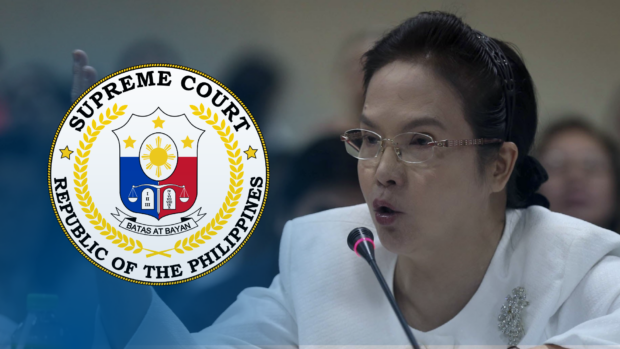SC slaps PAO chief Persida Acosta with P180,000 fine

FILE PHOTO: Supreme Court and PAO chief Persida Acosta. INQUIRER FILES
MANILA, Philippines — The Supreme Court has ordered Public Attorney’s Office (PAO) chief Persida Rueda-Acosta to pay fines totaling P180,000 for her adverse remarks against the new code of conduct for lawyers, or the Code of Professional Responsibility and Accountability (CPRA).
Acosta was fined P30,000 for indirect contempt of court and an additional P150,000 for grossly undignified conduct prejudicial to the administration of justice. The penalty came with a stern warning that “a repetition of the same or similar offenses shall be dealt with more severely.”
According to the high tribunal, Acosta’s remarks and “innuendos” on her Facebook page about the CPRA provision allowing public lawyers to represent opposing parties in court cases “attributed ill intent and malice to the court.”
“Atty. Acosta’s actions violated Sections 2 and 14, Canon II of the CPRA, which enjoin lawyers to respect the courts, to submit grievances against court officers only through the appropriate remedy and before the proper authorities, and to refrain from making unfounded statements insinuating improper motive on the part of court officers,” the court’s Public Information Office said in a statement on Tuesday.
READ: SC cites PAO chief for indirect contempt over remarks on CPRA
Article continues after this advertisementThe justices also ruled that Acosta violated her duty to observe and maintain due respect for the court and to promote respect for laws and legal processes when she issued an office order that “instigated disobedience” to the new conflict of interest rule for the PAO.
Article continues after this advertisementIn addition, the court said the PAO chief attempted to “sway public opinion to pressure the court into yielding to her position” when she launched a public campaign against the new provision using public attorneys and PAO staff and clients and when she publicized the contents of the PAO’s letters to Chief Justice Alexander Gesmundo requesting the deletion of the same rule.
The Inquirer sought Acosta’s comment on the matter, but she had yet to respond as of this writing.